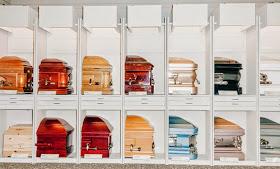 |
| Caskets--where China has made limited inroads into the US market. |
Make what you will of this rather morbid feature, but among the few things that are still Made in America purchased with regularity Stateside are caskets. Unfortunately, this phenomenon is not really down to the inferiority of China-made caskets or to the superiority of US-made ones but to the frustration of commerce by entrenched US firms. Apparently, the funeral industry is one of the few where pseudo-nationalistic arguments still hold water
somehow:
By importing from China, [Las Vegas-based entrepreneur Jim] Malamas has followed a well-worn outsourcing
playbook that’s upended markets for American-made goods from
electronics to bedroom furniture. Working with four factories outside
Shanghai, he imports 40-foot containers holding 64 caskets apiece and
sells them to funeral homes and regional distributors for a fraction of
the price. There is plenty of potential: In the U.S., caskets are a
$1.6 billion business.
[But] Chinese casket imports
haven’t gone as planned—for Malamas or anyone else. His revenue has
stumbled. Where almost every other American manufacturer has failed to
keep Chinese exports at bay, the casket industry has succeeded. Through
aggressive litigation against importers, xenophobic admonitions to
consumers, and good old-fashioned palm-greasing of funeral directors,
Big Casket has made sure that 9 out of 10 Americans go into the ground
in boxes made in the USA.
“The funeral industry has had a goddamn easy ride for the last 150 years,” says Joshua Slocum, the co-author of Final Rights: Reclaiming the American Way of Death and
executive director of the Funeral Consumers Alliance, a Vermont
nonprofit. “Why aren’t as many caskets imported as Chinese dishware? It
defies all known rules of supply and demand.”
The Big Three of US-made coffins--Hillenbrand, Matthews and Aurora AKA "Big Casket"--have done their dardnest to frustrate the entry of China-made coffins:
To keep business, Big Three reps visit homes, meet families, and buy
steak dinners. Funeral directors are often induced to sign nondisclosure
agreements in exchange for discounts and goodies, such as the
installation of casket showrooms.
Some funeral directors feel a patriotic duty to stick with the Big
Three, analysts say. The industry still supports more than 3,300 U.S.
workers, according to IBISWorld, an Australian market-research company.
But protectionist instincts have their limits. Isard of Foresight Cos.
tells the story of a funeral home client in North Carolina. A community
built on manufacturing hardwood furniture, the area had itself been
devastated by Chinese imports and was struggling with a 12 percent
unemployment rate. Isard’s client began carrying Chinese caskets,
displaying them on the left of its showroom, with American models on the
right. The former were a third to half the price. After six months,
70 percent of families were choosing imported. “When given the choice,
it’s just a box with a quilt,” Isard says.
Efforts to put Jim Malamas have included (bogus) mounting legal cases against him:
When Malamas entered the market, Big Casket moved quickly to defend
its turf. In 2006 a Matthews subsidiary filed suit, alleging that ACE
and its Chinese supplier were copying its designs. Matthews also sent
letters to funeral homes and distributors, threatening to sue if they
continued to buy from Malamas.
As the litigation dragged on, early customers bailed. Malamas had
$2 million in legal fees. A judge almost detained him in Texas. Malamas
says financial worries led his wife to divorce him.
“It was a nonsense lawsuit,” says Isard, who’s interviewed Malamas on
his podcast at FuneralRadio.com. “But it slowed him down. The Big Three
made their money back on legal fees many times over,” he says, by
keeping in the fold funeral home clients who might have switched to
Chinese caskets.
Apparently, the playing field is not yet level in all manufacturing industries in 2015.

